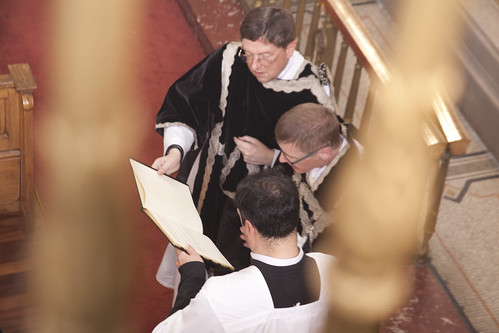 |
| Prayers for the Absolution at the Catafalque at a Requiem Mass: Fr Mark Elliot Smith (centre) at Our Lady of the Assumption, Warwick Street. |
This is an extract. Subscribers can read it all here.
He starts by noting that people who attend the Mass in English do not, actually, understand it: 'They get the essentials, but it’s a fair bet a lot of important stuff goes right over their heads – as it does over mine.' He continues:
The obvious reason for changing the language in the liturgy to that normally spoken by the congregation was to help them understand it. Latin was seen as a barrier. But the use of Latin also conveyed something else – that what the liturgy was dealing with were sacred mysteries, with hints of hidden meanings that could never be fully expressed or explained and did not belong in the ordinary day-to-day world of everyday speech.
For instance, take the phrase from the Gloria – Qui sedes ad dexteram Patris, which is translated into English as “Seated at the right hand of the Father”. That is a solid mental image, stripped of poetry and mystery. Translating it into English rips away the veil that the Latin supplied. That veil served a purpose. It said: “Here is something out of reach, something more than poetic analogy, that should not be exposed to the merciless light of rational analysis.” The Gloria is a love poem, not a seating plan.
Yet rational analysis and the use of literal imagery are precisely what the use of English invites. It certainly does not make the mystery easier to understand. Whatever Qui sedes ad dexteram Patris was meant to convey, the original thought sails over our heads uncomprehended, like a cricket ball beyond the outstretched hands of the fielder, while our mind wrestles with impossible questions – “How can the Son of God sit? How can God have a right hand?” – and we draw a puzzled blank expression.
The argument is made at greater length in the Position Paper on 'Latin as a Liturgical language' here.
Support the work of the LMS by becoming an 'Anniversary Supporter'.
No comments:
Post a Comment